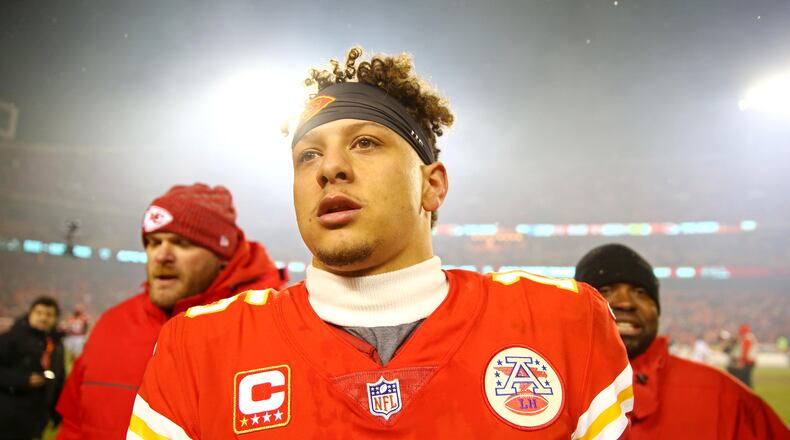Sunday’s NFL conference championship games are the logical outcome of a league that has engineered more offense for years. For the first time, the top four teams in points scored during the season are playing for a trip to the Super Bowl.
There isn’t an elite defense among the Chiefs, Rams, Saints and Patriots. Kansas City is downright bad, Los Angeles is below average and New Orleans is just OK. New England can make a case for being good (No. 7 in scoring defense), but that’s hard to do when the Patriots are so weak against the run.
Four lackluster defensive teams are on the cusp of coming to Atlanta because they are hard to stop. More than ever, offense rules in the NFL.
The league’s teams scored 23.3 points per game in 2018, the third-highest mark since the NFL formed in 1920. It was the sixth season in the past seven to rank among the top 10 in points scored per game.
Teams still can get through the wild-card round with great defense and ho-hum offense. The Cowboys did it this postseason. But it’s gotten to where advancing any further requires consistently scoring a lot of points.
This trend is why, despite their disappointing season, the Falcons are in relatively good position for 2019. They’ve been an elite scoring team in the recent past and, personnel-wise, still aren’t far from it.
Matt Ryan and Julio Jones still are in their primes. The Falcons also have Devonta Freeman, Austin Hooper, Mohamed Sanu and Calvin Ridley. That collection of playmakers compares favorably with those playing in Sunday’s games.
Chiefs quarterback Patrick Mahomes is an exciting player to build around, but he has much to prove. Brees (40-years old) and Brady (41) seem ageless, but Ryan (33) has more prime seasons left. The Falcons reasonably can expect at least three more seasons of top-tier play from Ryan (assuming his remarkably good injury luck holds).
Jones still is no worse than the third-best wide receiver in the NFL. The Saints have a budding young star in Michael Thomas, but he isn’t yet on that level. Kansas City’s Tyreek Hill is very good, but Jones is much bigger and runs tight routes like a much smaller man.
The NFL’s final four features the league’s best running back, Todd Gurley of the Rams. The rest of the running backs are no better than Freeman when he’s feeling right. His injuries are concerning, but don’t forget he was on the NFC Pro Bowl team in 2016 and Gurley wasn’t.
The Falcons have championship-level talent on offense. They have a defense that will look different when Keanu Neal, Deion Jones and Ricardo Allen all are healthy at the same time. They’ll have coach Dan Quinn running the defense again, and he has a great track record doing it (though, notably, the rules make it harder to play that old Seahawks style).
When the Falcons drafted Ryan in 2008, it wasn’t so obvious that building a roster heavy on offense was the way to go. It was becoming a clearer by the time they drafted Jones in 2011. Now there’s no question that great offensive football is essential for contenders because seemingly every new rule and interpretation favors that side of the ball.
The Falcons still have great offensive football players. What they don’t have is an effective offensive line. Among their five linemen, Quinn said he’s satisfied with the play only at center and left tackle.
The Falcons thought they were set at right tackle and figured they upgraded at the guard positions, but now they are looking at a rebuild. It won’t be simple for the Falcons to find as many as three new starters along the offensive line.
General manager Thomas Dimitroff said the Falcons will draft for need. They’ll have to get a little lucky to find a ready-made lineman with the No. 14 pick. The Falcons also need to shore up their defensive line, so that pick might be better used for that.
It also will be tricky for the Falcons to add pricey talent to both lines via free agency. They have about 25 percent of their salary-cap dollars devoted to three players: Ryan, Jones and cornerback Desmond Trufant. The Falcons can clear about $40 million in cap space with little trouble, but they need to take care of defensive tackle Grady Jarrett.
It won’t be easy to build the offensive line, but it’s possible. And the Falcons don’t necessarily need to add elite talent. They already have one Pro Bowl lineman, center Alex Mack, which gives them one more than the Rams and Patriots.
It’s reasonable to believe the Falcons can assemble a cohesive line with no clear weak link and anchored by Mack. That’s what they had while winning the NFC in 2016. If the Falcons can assemble a competent offensive line, they’ll have the kind of team that can make another championship run.
Fix the line, and the Falcons can regain their balance and score big consistently. Getting leads puts pressure on the opposing offense and makes the defense more effective. That’s the kind of complementary football the Falcons played in 2016.
That’s also how the Rams, Saints, Chiefs and Patriots made it to Sunday’s conference championship games. It’s the way it’s done now in the NFL, where great offense is so much more valuable than great defense.
About the Author
The Latest
Featured


